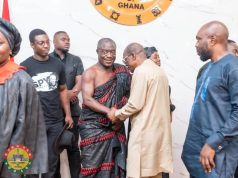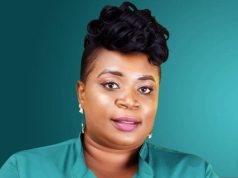The Chief Fisherman of Tema Awudum, Nii Ashitey Odamtey II, has sounded an alarm over the rampant illegal fishing activities along Ghana’s coastline, warning that over 80 percent of the country’s coastal communities are engaged in Illegal, Unreported, and Unregulated (IUU) fishing practices.
Speaking at a public durbar organized by final-year students of the African University College of Communications and Business (AUCB) at the Tema Canoe Basin, he stressed that if the issue is not urgently addressed with sustainable alternatives and stricter enforcement, the nation’s fisheries sector could collapse.
The durbar, themed “Sustaining Our Seas: Combating Illegal Fishing Through Community Action,” formed part of the students’ academic capstone project aimed at driving behavior change among artisanal fishermen to end IUU fishing practices.
The event brought together key stakeholders, including officials from the Fisheries Commission and the Marine Police Unit of the Tema Regional Police Command. They educated participants on the dangers of using chemicals, unapproved nets, and other destructive fishing methods, which not only violate Ghanaian laws but also breach international fisheries conventions. They further highlighted the importance of safe fish handling and the adoption of sustainable fishing practices.
Chairing the event, Nii Ashitey Odametey II lamented that while a majority of coastal communities are involved in illegal fishing, about 20 percent of others have ceased fishing activities altogether due to mounting challenges in the sector.
Some concerned fishers and processors present at the durbar shifted part of the blame onto industrial trawlers, asserting that artisanal fishermen are often scapegoated. They called on government to take decisive action against industrial vessels engaging in illegal practices and to introduce alternative livelihood programs to support local fishermen.
Philip Akuteu Azu, leader of the four-member AUCB student campaign group which includes George Opata, Patience Afari Yeboah, and Olive Sika, explained that their project aligns with the university’s mission of using communication to drive development. He noted that the decision to focus on illegal fishing was critical, given that fish provides over 60 percent of Ghana’s protein intake, emphasizing the need to promote safe and sustainable fishing to protect public health and the economy.
Team member George Opata further called on government to swiftly address the concerns raised by fishermen and to provide viable alternative livelihood opportunities, particularly during the closed fishing season, to reduce overdependence on the sea and support the regeneration of marine life.
The one-day durbar attracted fishermen, fish traders, canoe owners, personnel from the Marine Police Unit, officials from the Fisheries Commission, and members of the general public.
Send your news stories to newsghana101@gmail.com
Follow News Ghana on Google News









![Fuse ODG violently handcuffed, dragged out of his car by UK Police over alleged ‘Wee’ smell [Video]](https://ghananewss.com/storage/2023/05/Fuse-ODG-hand-100x75.jpeg)






